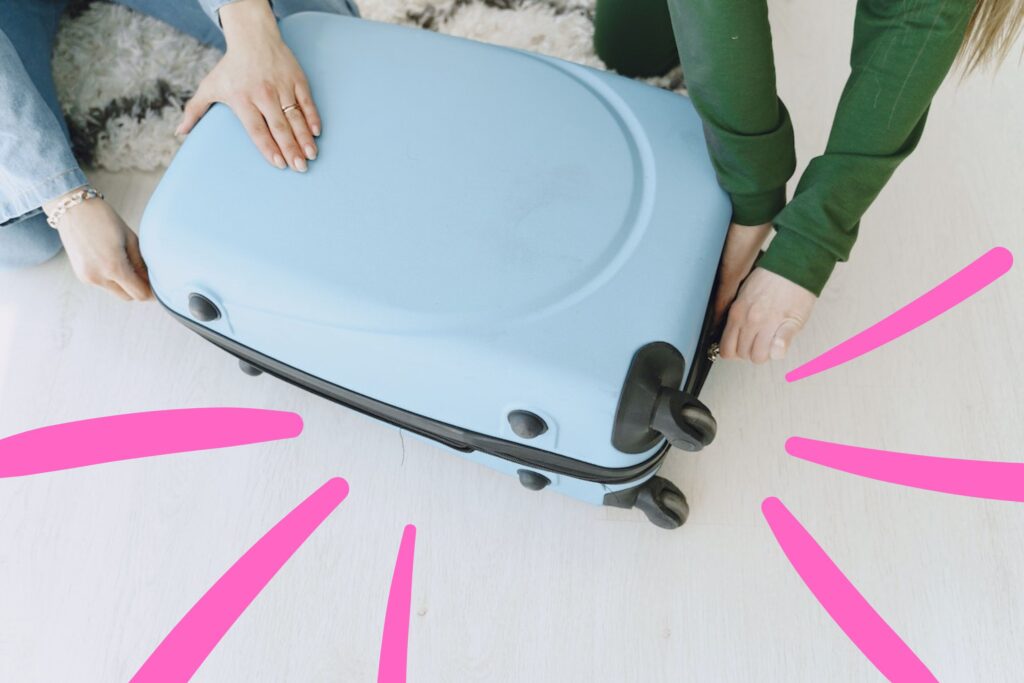And the IDEAL ways to fix them…
Your ideal international trip, whether it’s for business or pleasure, goes a little something like this; a smooth flight sees you safely to your destination, your hotel room is plusher than the pictures, the city inspires and surprises you, and head home with no hitches.
So often, it doesn’t happen that way. Between your flight, the country you’re visiting and the return home there’s a long list of things that can – and do – go wrong. This isn’t any excuse to lock the door, draw the blinds and hibernate at home ‘till it all blows over. Nope, it’s just about taking a few sensible precautions. With that in mind, here are 7 mistakes first time travellers make, and the IDEAL ways to fix them.
Overpacking For Your Trip
People who are paranoid about encountering too many emergency situations (sorry for potentially fuelling that neurosis with this piece) while traveling may think they should pack everything including the kitchen sink. We do need to wash our hands more, after all. In reality, this can lead to further stress, and increases the chance of items getting lost, misplaced or stolen.
Pack your bags with both lightness and a sense of purpose, and you can’t go wrong. Plus, the more bags you take, the more you’ll have to pay in airline baggage fees, which often comes as a surprise at the check in desk, framing the start of your holiday in a negative way. Keep things light and breezy, and check out our space saving tips for packing your suitcase; you’ve got this.

Compensation Claims
Just because they’re a global, capitalist, billion dollar company (actually, because of this), doesn’t mean airlines don’t make mistakes. Indeed, seats can get oversold, reservations lost or amended without prior warning, glitches in their flight systems can cause delays or worse, cancellations.
A rookie error is to accept these issues with a shrug. In fact, there are a number of (admittedly limited) scenarios where an airline is legally obligated to compensate passengers flying internationally, though they depend on where the airline’s flight is originating from. But if you experience significant delays for reasons other than weather, and the delay causes you to miss a connection or something else important, you can usually get compensation in one form or another.
Read: 5 things to do in the airport if your flight is delayed
Cash Or Card?
Securing your money while traveling internationally should be a priority. There are times you probably don’t want to carry cash, or at least very little of it. But it’s important to be aware that you may incur exchange fees for foreign withdrawals. Many of us avoid punitive currency-exchange rates at the airport by using our debit and credit cards on a summer trip.
Then, when we get our statements at the end of the month, we realise it wasn’t such a smart move. We’re often charged 2.5%-5% on foreign transactions, and a £1.50-£3 fee every time we withdraw cash from an ATM. It’s best, then, to travel with a pre-loaded travel card or even a virtual one.
Virtual debit cards are increasingly becoming a smart choice for international travelers. These digital-only cards can be created instantly through various fintech platforms and offer enhanced security since there’s no physical card to lose or have stolen. Many virtual cards also come with competitive exchange rates and the ability to instantly freeze/unfreeze them through an app.
Some of the best virtual debit card providers even allow you to create multiple cards for different purposes – perhaps one for accommodation bookings, another for day-to-day spending – helping you keep better track of your travel expenses. Just make sure to also carry a physical backup card, as not all merchants worldwide accept digital payments yet.

Not Learning Basic Local Phrases
Expecting everyone to speak English is a classic rookie move. While many tourist hotspots do cater to English speakers, not making any effort to learn even basic phrases in the local language can lead to frustrating miscommunications and, frankly, makes you look a bit entitled.
A simple “hello,” “thank you,” and “where is the bathroom?” in the local tongue can go a long way, and should be the absolute bare minimum. Not only does it show respect for the local culture, but it often results in warmer interactions with locals who appreciate the effort – even if your pronunciation is somewhat questionable. Plus, those phrase books on your phone don’t need Wi-Fi to work, so there’s really no excuse!
Rushing Through Everything
First-time travelers often fall into the trap of trying to squeeze every single sight, museum, and “must-do” experience into their itinerary. The result? A exhausting marathon that leaves you needing a vacation from your vacation. Racing from the Louvre to the Eiffel Tower to Notre-Dame in one day might sound efficient on paper, but you’ll likely end up too tired to truly appreciate any of them.
Instead, embrace the art of slow travel – build in some free time for wandering, people-watching at cafés, or simply getting lost in a new neighbourhood. Some of the most memorable travel experiences happen when you’re not checking items off a bucket list. Remember, you’re traveling to experience a new place, not to win a scavenger hunt!
Travelling Without Insurance
Traveller’s insurance is definitely something you should purchase. You can either get basic travel insurance, or your bank or home insurance may already have you covered. Don’t assume anything; make the necessary checks and do invest in some if you’re not already accounted for in this apartment.
Mishaps do happen when on the move, and for extra assurance, for peace of mind as much as anything, comprehensive travel insurance cover is recommended. Keep in mind though, that if you choose to visit a dangerous country, e.g. war-zones or at risk of terrorism, the carrier may reject the application. Ditto if you don’t declare any pre-existing medical conditions.
You’ll want to get enough both cancellation and medical insurance to cover every eventuality, whether that’s a spell in hospital due to an accident (or worse, something costly like surgery or an air ambulance), a re-arranged flight, or even the costs incurred to replace lost luggage.

Obsessively Reading These Type Of Articles
A glorious adventure overseas defined by freedom, frivolity and a spontaneous spirit can be quickly tempered by travel-based anxiety. Doomscrolling, catastrophising and hypothesising the worst isn’t going to make your trip any less prone to surprises, so exercise a little caution in reading articles such as this!
Instead, why not enjoy a little escapism with these 14 winter destinations for your travel bucket list? Bon Voyage!





